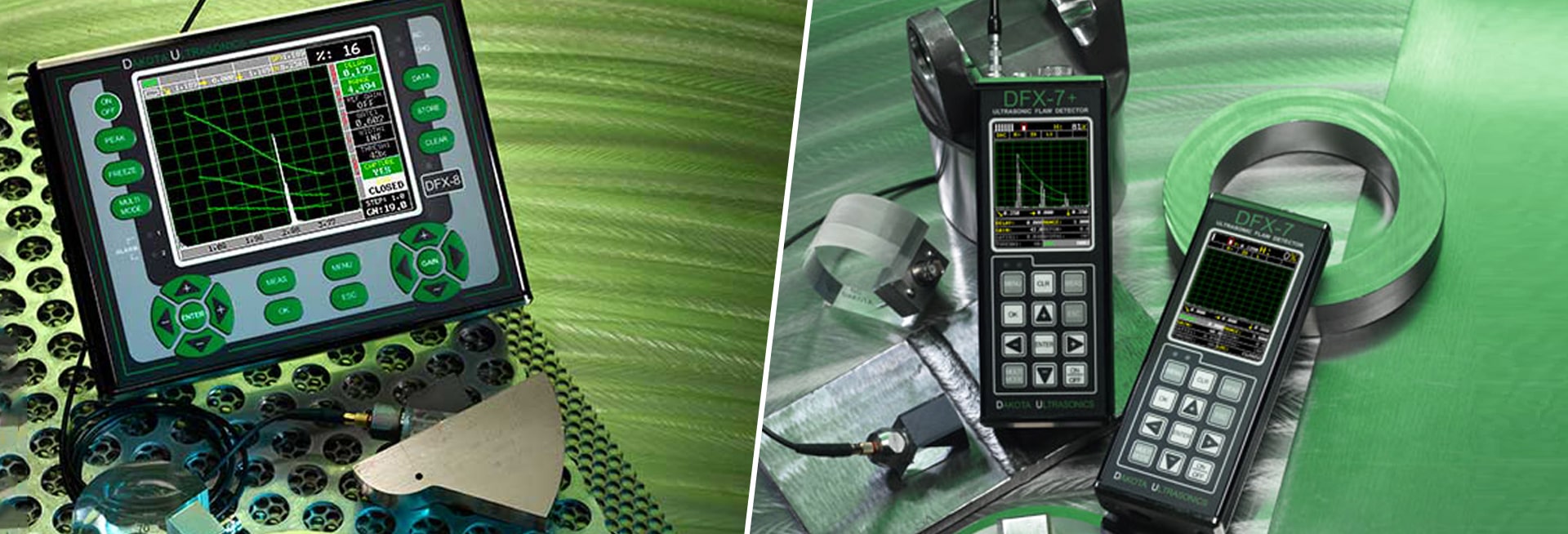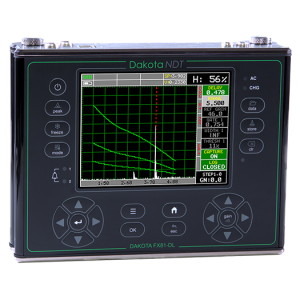Dakota Ultrasonic Flaw Detectors are the industry standard for high performance flaw detectors.
Flaw detection is the most commonly used technique among all the applications of industrial ultrasonic testing. Ultrasonic flaw detector transmits high frequency sound waves through a given medium at a specific velocity, when they encounter a boundary with a different medium they get reflected back & generate clear echo patterns.
This technique is used during the manufacturing of composites, welds, metal alloy plate or rolling mill stock products to detect voids, inclusions, and flaws and adjust process parameters to eliminate these manufacturing defects.
Ultrasonic flaw detection is important in the aerospace, automotive, infrastructure (bridges, towers, etc.), manufacturing, marine, oil & gas and power generation industries. Aging structures such as bridges, airframes, pressure vessels, reactors, and ships also require nondestructive testing to ensure material integrity, airworthiness, and overall safety for humans as well as environment and the prevention of major capital equipment losses.
A variety of flaws occur in materials and parts either during manufacturing or due to aging effect in the field:
- Void / Pores
- Inclusions
- Cracks (subsurface or surface)
- Weld Bond Defects
- Corrosion / Oxidation
- Abrasion / Erosion
- Machining or Grinding Damage
- Forging Flaws
- Casting Flaws
- Forming / Rolling Mill Flaws
- Adhesive / Sealant Debonding
- Composite / Honeycomb Delamination
- Wire Rope / Cable Flaws
- Pipe / Tubing Flaws
Ultrasonic flaw detection technique is used for the detection of inherent defects such as cracks, inclusions, or other discontinuities in metals, plastics, ceramics and composite materials.
Stanlay is an authorized distribution partner to Dakota Ultrasonic USA for its range of instruments. Here we offer 4 models of flaw detectors :
FX70-DL, FX71-DL, FX80-DL, FX81-DL Dakota Ultrasonic Flaw Detectors for the applications of industrial ultrasonic testing (Locating Pits, Flaws and blind surface corrosion) & coating thickness measurement.
|
Application
|
Locate Flaws, Measure material thickness & coating
|
|
Model
|
FX70-DL |
FX71-DL |
FX80-DL |
FX81-DL |
|
Transducers
|
Use flaw Transducers & wedges &/or transducers for thickness gauges select per application
|
|
Flaw Features
|
TRIG, DAC, AWS, AVG/DGS, TCG, Auto calibration
|
|
Flaw measurement Range
|
P-E: 0.63mm to 3.48cms
|
|
Thickness gauge modes
|
P-E, PECT, PETP, E-E, E-EV, CT, Differential model for QC inspection , high speed scan up to 50 reading per second
|
|
Pulsar
|
2 Adjustable square wave pulsar & receives
|
+Tow tone burst pulsars
|
|
Pulsar voltage
|
100-200 peak volt amplitude rise/fall time <10ns up to 50ohm
|
100 to 400 V
|
|
Pulse widths
|
40 ns to 400ns
|
|
Frequency Band
|
1.8 to 19 MHz
|
Additionally, 3 narrow bands at 2,5 & 10 MHz
|
+ Narrow bauds at
0.5 & 15 MHz
|
|
Display
|
¼ VGA AMOLED color Display
|
5.7 inch diagonal, Blanview sunlight readable color, QVGA Color TFT Display
|
|
Display size
|
43.2x57.6mm
|
4.54x3.40m (5.7” Diagonal)
|
|
Application
|
Thickness Gauge Features
|
|
Model
|
FX70-DL |
FX71-DL |
FX80-DL |
FX81-DL |
|
Pulse-Echo Mode (P-E) Pit &
Flaw Detection
|
0.63mm to 3048 cm
|
|
Pulse-Echo Coating Mode (PECT) : (Material, Coating, Pit & Flaw Detection)
|
Material: 0.025 in to 96 in (0.63mm to 244 cm) Coating: 0.001 to 0.100‘’ (0.01 to 2.54 mm)
|
Measures from 0.025 in to 100 ft. (0.63mm to 3048 cm) Coating: 0.001 to 0.100‘’ (0.01 to 2.54 mm)
|
|
Pulse-Echo Temp Comp Mode (PETP) -
(Pit & Flaw Detection),
|
Auto temperature compensation range
0.025 in to 96 in (0.63 mm to 244 cm)
|
Auto temperature compensation measures from
0.025 in to 100 ft. (0.63 mm to 3048 cm)
|
|
Echo-Echo Mode (E-E) - (Thru Paint & Coatings)
|
Range 0.050 to 4.0‘’ (1.27 to 102 mm). Single Delay Line - 0.007 to 1.00 in (.178 to 25.4 mm) Single Contact - 0.040 in to 10 ft. (1 mm to 305 cm). Will vary based on coating
|
|
Echo-Echo Verify (E-EV) - (Thru Paint & Coatings)
|
Range 0.050 to 1.0‘’ (1.27 to 25.4 mm). Will vary based on coating
|
|
Coating Only Mode (CT) - (Coating Thickness)
|
Range 0.0005 to 0.100‘’ (0.0127 to 2.54 mm). Range will vary +/- depending on the coating
|





